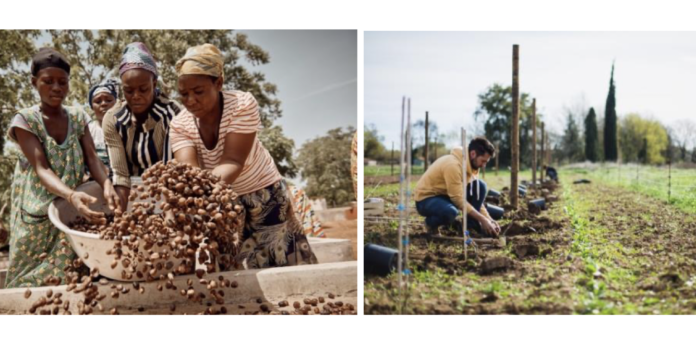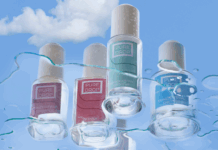Within the framework of the Fair Trade fortnight, L'Occitane en Provence confirms its position in favor of an ethical economic model and commits to accompany all its iconic ingredient producers in their fair trade certification process. Sustainable and structuring, this certification is an essential prerequisite to meet the ambitious objective that L'Occitane has set for itself: to increase the resilience of all in the face of future climatic and social impacts.
L'Occitane and shea butter, a successful model of a fair trade industry
Since its beginnings, L'Occitane has chosen an ethical and sustainable approach: to protect nature and support the people who take care of it. This pioneering approach began in 1980, when the brand's founder met with women who produce Shea butter in Burkina Faso. The foundations of a fair and sustainable partnership were immediately established: the brand buys directly from women's cooperatives, from whom it purchases a processed product with high added value.
In 2009, obtaining the Ecocert Fair Trade certification, according to the international Fair for Life standard, will recognize the value of this partnership established on multi-year contracts, the implementation of pre-financing and the guarantee of a fair purchase price. For L'Occitane, it is the recognition of an exceptional collaboration participating in the preservation of traditional know-how and the improvement of living conditions for these communities of women.
On the solid foundation of this fair trade certification, L'Occitane is launching the Resist program (resilience, ecology, strengthening, independence, structuring and training) in 2018. "We have helped more than 10,000 women to preserve the shea trees of which they are the guardians, to modernize and limit the environmental impacts of their butter production processes and, above all, to become less dependent on L'Occitane's orders by developing their portfolio of activities and clients.says Justine Humbert, sustainable channels manager. Symbolizing a policy of continuous development, the Resist program consolidates the foundations of a sustainable future for the shea industry. The "exemplary" nature of this supply chain was praised by the United Nations Development Program (UNDP) in 2013 and 2019.
Fair trade and agroecology, a sustainable goal
Building on its experience with shea butter, the L'Occitane brand is now committed to supporting all of its producers of iconic ingredients in Provence and Corsica, so that they can obtain fair trade certification by 2025. Among the sectors concerned are almond, cade wood, immortelle, lavender, rose and verbena. "This is an extremely structuring approach for securing our supplies. The recent health and political crises we have experienced have proven the need for multi-year contracts and the vital value of lasting partnerships.explains Justine Humbert. And this is and will be even more the case with the environmental challenges of our time. For producers, fair trade ensures the sustainability of their operations and allows them to invest in the future. "Fair trade is part of the solution, it offers everyone a much better resilience in an unstable environment."
For L'Occitane, there is no agro-ecological transition without economic equity: fair trade establishes the prerequisites for the ecological transition. In order to support this certification process while accompanying its producers in their necessary agro-ecological transition, L'Occitane has decided to participate in the creation of the Agroecology and Fair Trade association in 2021, bringing together some fifteen partner farms.
Its objectives are multiple: to enable its members to obtain fair trade certification by providing them with the necessary associative framework, to gain access to the fair trade development fund once certification has been obtained, and to pool learning and share knowledge in agroecology. In particular, the association benefits from the support of agricultural engineers from the Biodiversity and Sustainable Ingredients department and external experts to deploy experiments in agroforestry or soil cover. " While producers are on the front line of climate change, they are also part of the solution. It is our responsibility to implement commercial partnerships but also technical, financial and human support that will enable them to initiate this ecological transition. We must share the risks inherent in these changes in practices.according to Justine Humbert. She concludes: "Promoting equity, inclusion and regenerative agriculture is not philanthropy, it is the only possible response of our companies to today's challenges. It's also the only possible path as citizens, as parents, to provide a bright future for our children."








